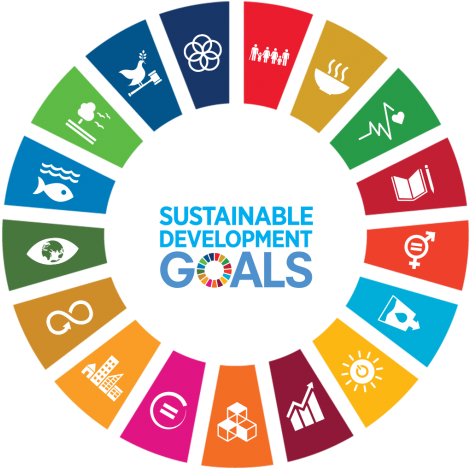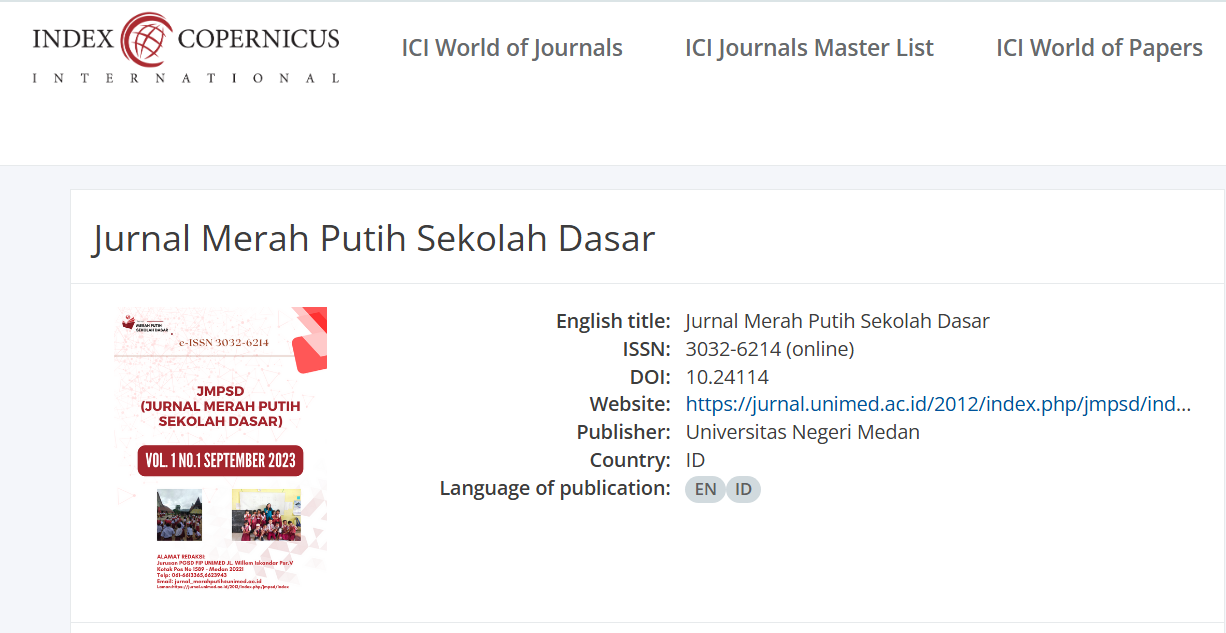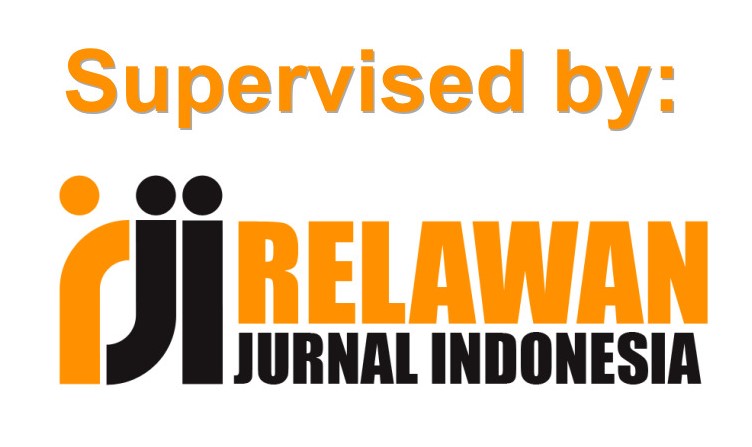THE EFFECT OF THE ROLE PLAYING LEARNING MODEL ON STUDENTS’ BEHAVIOR IN RESPECTING DIVERSITY IN PANCASILA EDUCATION SUBJECTS OF GRADE IV AT SDN 101773 KOLAM, PERCUT SEI TUAN DISTRICT
DOI:
https://doi.org/10.24114/jmpsd.v1i4.58787Abstract
The problem underlying this research is that students' behavior still lacks respect for the diversity around them, which can be seen from the way students make friends and interact with their friends. The aim of this research is to determine the effect of the role playing learning model on student behavior in appreciating diversity in class IV Pancasila Education subjects at SDN 101773 Kolam Kec. Percut Sei Tuan. This research uses a quasi-experimental research method and a posttest only control design. The subjects of this research were class IV, totaling 44 students. Data collection uses observation and questionnaires. Data analysis techniques were carried out using descriptive analysis and hypothesis testing. Based on the results of the analysis, the experimental class with the role playing learning model obtained an average score of 78.78, while the control class with the conventional learning model obtained an average score of 72.33. Furthermore, the results of hypothesis testing through the independent t-test of behavior respecting diversity in Pancasila education subjects between the experimental class and the control class obtained a significant level value (2 tailed) < 0.05, namely 0.035. This means that H0 is rejected and Ha is accepted. So it is concluded that the role playing learning model influences students' behavior in appreciating diversity in class IV Pancasila Education subjects at SDN 101773 Kolam, Kec. Percut Sei Tuan. Keywords: Learning Model, Role Playing, Student Behavior, Respect Diversity.References
Akhyar, S. M., & Dewi, D. A. (2022). Pengajaran Pendidikan Pancasila Di Sekolah Dasar Guna Mempertahankan Ideologi Pancasila Di Era Globalisasi. Jurnal Kewarganegaraan, 6(1), 1941-1946.
Alhadiq, M. F. A., & Ramadhan, G. M. R. (2021). Persepsi Guru Terhadap Toleransi Siswa SD. Jurnal Mutiara Pedagogik, 6(1), 1-10.
Amalia, R., & Mustika, D. (2023). Penguatan nilai karakter tanggung jawab melalui pembelajaran pendidikan pancasila di kelas IV SD Negeri 83 Pekanbaru. Didaktik: Jurnal Ilmiah PGSD STKIP Subang, 9(3), 389-403.
Ananda, R. & Fadhli Muhammad. (2018). Statistik Pendidikan (Teori dan Praktik Dalam Pendidikan). Medan: CV. Widya Pustaka.
Anggawituna, R. (2022). Pengaruh Model Pembelajaran Role Playing (Bermain Peran) pada Kemampuan Mendemonstrasikan Nilai-Nilai Kehidupan Dalam Cerita Pendek (Eksperimen pada Peserta Didik Kelas XI SMA Negeri 3 Ciamis Tahun Ajar 2021/2022) (Doctoral dissertation, Universitas Siliwangi).
Anggraeni, M., Febriyani, S. A., Wahyuningsih, Y., & Rustini, T. (2022). Pengembangan Sikap Toleransi Siswa Sekolah Dasar Pada Keberagaman di Indonesia. Jurnal Gentala Pendidikan Dasar, 7(1), 16-24.
Anggraini, D. W. (2021). Pengaruh Model Problem Based Learning Terhadap Karakter Toleransi Peserta Didik Pada Mata Pelajaran PKn di Kelas IV MIS ˜AISYIYAH Bandar Khalipah (Doctoral dissertation, Universitas Islam Negeri Sumatera Utara Medan).
Azis, A. C. K., Waliyul Maulana Siregar, Feriyansyah, & Mesra. (2023). Pendampingan Mural Kebhinekaan di SD Negeri 101744 Desa Klambir Sumatera Utara. Jurnal Gembira: Pengabdian Kepada Masyarakat, 1(02), 483“494.
Dhalimunthe, Torkis dan Endayani Henny. (2018). (Bahan Ajar) Pembelajaran PKn Di MI/SD. Medan.
Fadli, M. R. (2023). Pengaruh Kemampuan Guru Dalam Mengelola Kelas Terhadap Minat Belajar Peserta Didik Mata Pelajaran Pendidikan Pancasila Kelas IV SD Negeri 01 Pakisaji Kabupaten Malang. Ibtidaiyyah: Jurnal Pendidikan Guru Madrasah Ibtidaiyah, 2(2), 106-116.
Girsang, L. A. (2023). Pengaruh Model Pembelajaran Role Playing Terhadap Hasil Belajar Tematik Siswa Kelas I Sd Negeri 124398 Pematang Siantar. Pengembangan Penelitian Pengabdian Jurnal Indonesia (P3JI), 1(2), 74-83.
Huda, Miftahul. 2017. Model-model Pengajaran dan Pembelajaran. Yogyakarta: Pustaka Pelajar
Lubis, N. M. (2019). Pengaruh model pembelajaran role Playing terhadap hasil belajar siswa kelas IV MIN 8 Medan Kecamatan Medan Petisah pada mata pelajaran Pendidikan Kewarganegaraan (PKn) TA 2018/2019 (Doctoral dissertation, Universitas Islam Negeri Sumatera Utara).
Martati, B., Mirnawati, L. B., & Firmannandya, A. (2023). Analisis Penerapan Model Pembelajaran Problem Based Learning Dalam Mata Pelajaran Pendidikan Pancasila Sekolah Dasar. PROCEEDING UMSURABAYA.
Merliana, L., & Suhertuti. (2018). Strategi Belajar Mengajar Bahasa Indonesia. Bandung: Rosdakarya.
Munthe, S. B. (2021). Analisis Kesulitan Belajar Siswa Materi Sikap Menghargai Keberagaman Suku dan Budaya Pada Mata Pelajaran IPS Kelas IV SD Swasta Wijayanta Tigapanah Tahun Ajaran 2020/2021 (Doctoral dissertation, UNIVERSITAS QUALITY).
Ningrum, I. W., dkk. (2023). Meningkatkan Sikap Toleransi Siswa Melalui Metode Role and Playing pada Materi Keberagaman di Indonesia Kelas 4 SDN KELEYAN 2. INOVASI: Jurnal Ilmiah Pengembangan Pendidikan, 1(3), 184-191.
Norazmi, M. (2019). Pengaruh Model Pembelajaran Role Playing Terhadap Hasil Belajar PKn Materi Keputusan Bersama Kelas V di Sekolah Pada SD Negeri 101870 Desa Sena (Doctoral dissertation, Universitas Islam Negeri Sumatera Utara).
Siregar W. M., Gandamana A., & Feriyansyah. (2022). Pengembangan Pembelajaran PKN di SD. Medan: Universitas Negeri Medan.
Siregar, W. M., Gandamana, A., & Putri, S. R. (2019). Tripusat Pendidikan Sebagai Penguatan Pendidikan Karakter Anak Sekolah Dasar. In Seminar Nasional Pendidikan Dasar Universitas Negeri Medan (pp. 44-53).
Sugiyono. (2019). Metode Penelitian Kuantitatif, Kualitatif, dan R&D. Bandung: Alfabeta.
Sugiyono. (2021). Metode Penelitian Kuantitatif, Kualitatif, dan R&D. Bandung: Alfabeta.

Downloads
Published
How to Cite
Issue
Section
License
Copyright (c) 2024 Jurnal Merah Putih Sekolah Dasar

This work is licensed under a Creative Commons Attribution-ShareAlike 4.0 International License.
Authors who publish with this journal agree to the following terms: (1) Authors retain copyright and grant the journal right of first publication with the work simultaneously licensed under a Creative Commons Attribution-ShareAlike 4.0 International License (CC-BY-SA) that allows others to share the work with an acknowledgment of the work's authorship and initial publication in this journal; (2) Authors are able to enter into separate, additional contractual arrangements for the non-exclusive distribution of the journal's published version of the work (e.g., post it to an institutional repository or publish it in a book), with an acknowledgment of its initial publication in this journal; (3) Authors are permitted and encouraged to post their work online (e.g., in institutional repositories or on their website), as it can lead to productive exchanges, as well greater citation of published work (See The Effect of Open Access).




































